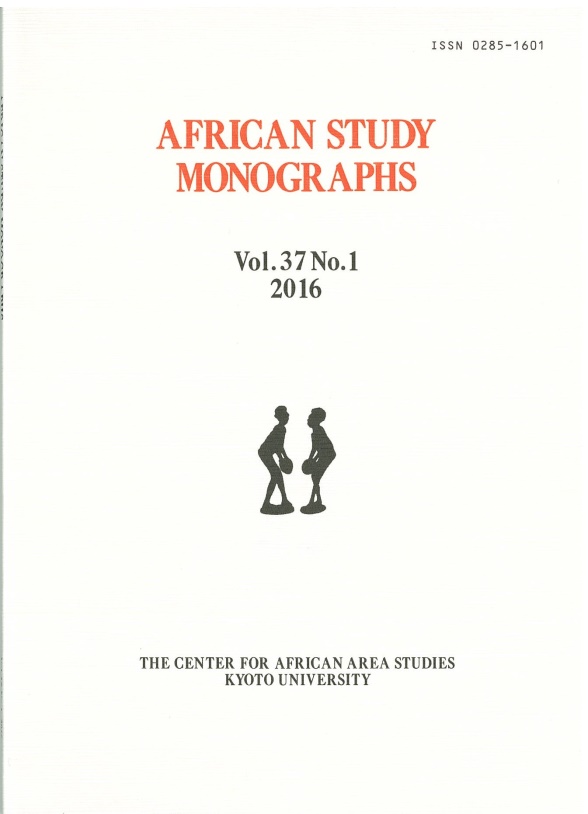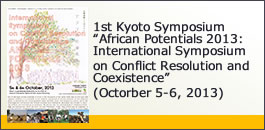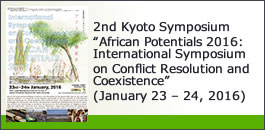Date:December 4-5, 2014
Venue:Tou’Ngou Hotel, Yaoundé, Cameroon
Outline
The project has organized the “African Forums on Conflict and Coexistence” annually in Africa and has developed international discussion with researchers and strategists from African countries. In the first year of the project, the forum was held in Nairobi in December 2011, followed by the second forum in Harare in December 2012, and the third forum in Juba in December 2013. The venue was then transferred westwards, to Yaoundé, for the fourth forum in December 2014. Realization of this forum is attributed to the close collaborative relationship which Japanese researchers have firmly established with the Department of Anthropology in the University of Yaoundé I.
The Yaoundé Forum hosted oral presentations (including a keynote speech) from nine African and six Japanese researchers who have focused on studies in central and western Africa. In addition to these speakers, four African researchers who have continuously taken important roles in the past three “Conflict and Coexistence Forums,” and six Japanese key members of this research project also joined as commentators. While outcomes of the past three forums are being reviewed, at this forum a lively exchange of views from diverse perspectives illuminated what are the “African Potentials” which could be utilized for conflict resolution and coexistence.
After Professor Itaru Ohta, head of the research project, explained the purpose of the forum at the beginning, Professor Edward Kirumira of Makerere University contributed critical comments on the past three African forums as well as the research project as a whole. He discussed the importance of developing the concept of “African Potentials” incorporating critical reviews and leading to practice, without romanticizing, compartmentalizing, nor essentializing it.
Following Professor Kirumira, Professor Francis Nyamnjoh of the University of Cape Town presented a keynote speech titled “Incompleteness: Frontier Africa and the Currency of Conviviality”. Prof. Nyamnjoh is an anthropologist from Cameroon, and is one of the mid-career African intellectuals who has extensively explored broad topics ranging from recent developments in chieftaincy in Cameroon, mobility of people in cities, and issues surrounding race and nationalities in South Africa and Botswana. In this keynote speech, he talked about “conviviality”, a central concept of his discussion, with reference to the mobility, variability and presence of frontier-ness among the African characters experiencing transformation in Amos Tutuola’s book, “The Palm-Wine Drinkard”. Presumably, his concept of “conviviality” should be a great theoretical support for the exploration of “African Potentials”.
In the same way as the past forums, the participants received the following five questions prior to this Yaoundé Forum. The presenters were requested to prepare a paper in 2000 to 3000 words, answering these questions based on their own experience in their research fields in an attempt for focused discussion.
- What are African Potentials that can be utilized for conflict resolution, reconciliation and social healing? (the concept of African Potentials could be ambiguous, multifaceted and problematic including conservative/liberal/radical ideologies.)
- How can they work in a conflict resolution process?
- How can African Potentials be articulated with global/universal system of justice and conflict resolution and how could they satisfy both of local and universal justice and protect human rights at once in addressing “bad, politically incorrect customs”?
- African Potentials may include negative aspects. How those negative aspects cause situation of conflict worsen and how can they be dealt with?
- What are unique conflict patterns, if any, in West and Central African contexts that are different from those in other African regions?
Following the keynote speech, fourteen oral presentations were made in the five panel groups in the forum. The program is as below.
In these oral presentations, issues on conflict resolution and coexistence were discussed in relation to many concrete points, such as multi-ethnicity and indigeneity; roles of families or groups sharing the same origins; funeral rites and magic; chieftaincy; states and societies in post-war societies; and roles of the youth.
The following section summarizes issues raised in the oral presentations and discussion. At the general discussion held at the end of the forum, debate was made in reference to these issues.
Major Discussion Issues
- Are TCRMs (“Traditional Conflict Resolution Mechanisms”) useful? If so, how and where? Traditional leaders, marriages, gift exchange, family, rituals, and even witchcraft. What can be a common thread?
- Cameroon seems to be peaceful, relatively speaking, both at local and national levels. How conflicts are contained without developing into more violent ones (Farmers – hunter-gatherers – (migrant traders) – rival ethnic groups).
Also, farmer–herder relationship in Niger, witchcraft accusations in Nigeria, Muslim–non-Muslim relationships. - The Regional context: Central & West Africa (Cameroon, the two Congos, Nigeria, Niger, Sierra Leone, Burkina Faso). Is there a regional context?
Comparison with other regions, East, North-East and the Southern Africa. Common and different features. - Angry and hungry youths and conflict: their agency. Vanguard or Vandals? (not adequately argued in the past African fora)
Street gangs, “vagabonds,” village vigilantes, militias, and soldiers. Their social inclusion/exclusion. Seeking for ranks and titles, … - Historical perspective, or historicizing conflicts, especially from a perspective of the globalized economic system. 25 years have passed since 1989, the turning point of world history. Or, more than 3 decades since the time of SAPs. Neo-liberalism and globalization in Africa already have their own history.
- Structure and agency
Different structures and agencies, in relation to conflicts, need to be identified and classified.
Traditional/modern, rural/urban, national/transnational.
Is co-existence/cohabitation possible among social groups whose relations are asymmetrical and unequal? (“Can masters and slaves co-exist?”) - The role of diaspora. A new topic brought to our attention during this forum. Distant nationalism, remittance and investment, circular movements … A part and parcel of “African Potentials”?
- Conviviality and Incompleteness: A new understanding of “African Potentials”?
Is it a liberation/emancipation from the obsession, imposed by West, of completeness and rationality? Is there a danger that it would be considered a new version of neopatrimonial state model? That is, “Africa works,” irrespective of, or to be exact, because of a variety of incompleteness.
Program
The Forth Forum on “Comprehensive Area Studies on Coexistence and Conflict Resolution Realizing ‘African Potentials’”
December 5 (Fri.)
- 9:30 – 9:40 Opening Remarks
- Prof. Itaru Ohta (The Center for African Area Studies, Kyoto University, Japan)
- 9:40 – 9:55 Welcome Address
- Prof. Mbonji Edjenguèlè (Department of Anthropology, University of Yaoundé I, Cameroon)
- 9:55 – 10:05 Special Remarks on ‘African Potentials’ Project
- Prof. Edward K. Kirumira (College of Humanities and Social Sciences, Makerere University, Uganda)
- 10:05 – 10:10 Introduction of the Keynote Speaker
- Prof. Motoji Matsuda (Graduate School of Letters, Kyoto University, Japan)
- 10:10 – 11:00 Keynote Speech
- Prof. Francis B. Nyamnjoh (Department of Social Anthropology, University of Cape Town, South Africa) Incompleteness: Frontier Africa and the Currency of Conviviality
- 11:00 – 11:10 Coffee/tea break
- 11:10 – 12:45 Panel 1: Conflict and Coexistence in Multi-Ethnic Societies
Chair: Prof. Sam Moyo (The African Institute for Agrarian Studies, Zimbabwe) - 1)Prof. Godefroy Ngima Mawoung (University of Ngaoundéré, Cameroon)
- Bantu Bakola/Bagyelli: A Secular Permanent Conflictual Cohabitation
- 2)Dr. Takanori Oishi (The Research Institute for Humanity and Nature, Japan)
- Land Conflict in Multi-Ethnic Context: Trans-Ethnic Negotiation and Cultural Transmissions in the Expansion Process of Cocoa Farming in Southeastern Cameroon
- 3)Prof. Shuichi Oyama (The Center for African Area Studies, Kyoto University, Japan)
- Importance of Meeting and Mediators Concerned with Local Conflicts of Nigerien Sahel, West Africa: From Viewpoints of Neutralization, Gratitude and Giving-Receiving Customs
- *Comments on Session 1
- Prof. Gebre Yntiso (College of Social Science, Addis Ababa University, Ethiopia)
Prof. Daiji Kimura (The Center for African Area Studies, Kyoto University, Japan) - 12:45 – 14:00 Lunch break
- 14:00 – 15:50 Panel 2: Conflict and Resolution from Micro Perspectives
- Chair: Prof. Kennedy Mkutu (United States International University, Kenya)
- 1)Prof. Honoré Mimche & Dr. Blaise Nguendo Yongsi (Institut de Formation et de Recherche Démographique, Cameroon)
- Family as Space of Conflicts Resolution in African Traditional Societies
- 2)Prof. Luc Tamba Mebenga (Department of Anthropology, University of Yaoundé I, Cameroon)
- Seeking Peace through the Bëti Funeral Rites in South Cameroon
- 3)Prof. Hidetoshi Kondo (College of Foreign Studies, Kansai Gaidai University, Japan)
- Magical Turn of Relations: Rethinking Conflicting Relationships in the Study of African Witchcrafts
- *Comments on Session 2
- Prof. Edward K. Kirumira
Prof. Itaru Ohta - 15:50 – 16:10 Coffee/tea break
- 16:10 – 17:30 Panel 3: Violent and Non-Violent Conflicts in Congo and Cameroon
- Chair: Prof. Shuhei Shimada (Graduate School of Global Studies, Tokyo University for Foreign Studies, Japan)
- 1)Prof. Rémy Bazenguissa-Ganga (École des Hautes Études en Sciences Sociales, France)
- Democratization by Taking up Arms: Containing Violence in the Two Congos
- 2)Prof. Antoine Socpa (Department of Anthropology, University of Yaoundé I, Cameroon)
- “Autochthons” and “Allochtons” divide, Ethnic Stereotypes and Social Conflicts in Cameroon
- *Comments on Session 3
- Prof. Sam Moyo
Prof. Eisei Kurimoto (Graduate School of Human Sciences, Osaka University, Japan)
December 6 (Sat.)
- 10:00 – 11:50 Panel 4: “Traditional” Authorities as Potential
- Chair: Prof. Edward K. Kirumira
- 1) Prof. Hisashi Matsumoto (College of Education and Human Sciences, Yokohama National University, Japan)
- Chieftaincy as an African Potential in Contemporary Nigeria: Reimagining Home among the Igbo Migrants from Southeastern Nigeria
- 2) Dr. Takao Shimizu (The Research Institute for Humanity and Nature, Japan)
- Marginalized Muslim and Reproduction of Muslim in Burkina Faso
- 3) Dr. Ange Bergson Lendja (Université Paris 8, France) & Prof. Misa Hirano-Nomoto (The Center for African Area Studies, Kyoto University, Japan)
- The Dynamics of Conflicts Resolution in Bamileke Chiefdoms in Cameroon: The State, Traditional Authority, and Supernatural Power
- *Comments on Session 4
- Prof. Kennedy Mkutu
Prof. Motoji Matsuda - 11:50 – 13:30 Lunch break
- 13:30 – 15:20 Panel 5: Struggles of Youth for Survival in Conflict and Post-Conflict Societies
- Chair: Prof. Gebre Yntiso
- 1) Dr. Hideyuki Okano (Osaka School of International Public Policy, Osaka University, Japan)
- Public Authorization of an Informal Sector Activity: Institutionalization of Motorbike Taxi in Post-Conflict Sierra Leone
- 2) Dr. Daniel E. Agbiboa (Department of International Development, University of Oxford, UK)
- Turning the Tide against the Boko Haram Insurgency: An Increasing Role for Local Youth
- 3) Dr. Cyril Obi (The Social Science Research Council, USA) & Dr. Godwin Onuoha (Princeton Institute for International and Regional Studies, Princeton University, USA)
- Youth Conversations in a Post-Amnesty Niger Delta: An Analysis of the Potential for Sustainable Peacebuilding in Nigeria’s Oil-Rich Region
- *Comments on Session 5
- Prof. Shuhei Shimada
Prof. Yoichi Mine (Graduate School of Global Studies, Doshisha University, Japan) - 15:20 – 15:40 Coffee/tea break
- 15:40 – 16:50 General Discussions
- Chair: Prof. Eisei Kurimoto
- 16:50 – 17:00 Concluding Remarks
- Prof. Itaru Ohta





 Exploring African Potentials, Mila Special Issue
Exploring African Potentials, Mila Special Issue
